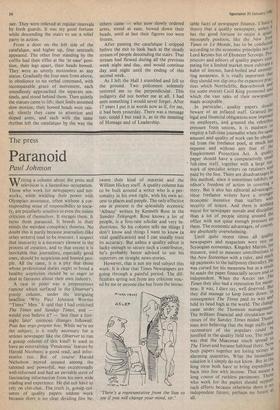The press
Paranoid
Paul Johnson
Writing a column about the press and television is a hazardous occupation. Those who work for newspapers and net- works, while wielding their power with Olympian assurance, often without a cor- responding sense of responsibility to socie- ty, are peculiarly sensitive to even the tiniest criticism of themselves. It enrages them. It turns them paranoid. It breeds in their minds the weirdest conspiracy theories. No doubt this is partly because journalists (like other writers) tend to be insecure. I suspect that insecurity is a necessary element in the process of creation, and to that extent it is inevitable that journalists, especially good ones, should be suspicious and hunted peo- ple. All the same, it is a pity that those whose professional duties ought to breed a healthy scepticism should be so eager to deal in fantasies about their own industry.
A case in point was a preposterous rumour which surfaced in the Observer's gossip column, under the intriguing headline 'Why Paul Johnson Worries "Times" Men.' It said that I had criticised The Times and Sunday Times, and would you believe it? — 'less than a fort- night later' ominous changes followed. Post hoc ergo propter hoc. While we're on the subject, is it really necessary for a serious newspaper like the Observer to run a gossip column of this kind? 'It used to have an entertaining Pendennis' feature by Harold Nicolson; a good read, and infor- mative too. But of course Harold Nicholson moved around among the talented and powerful, was exceptionally well-informed and had an enviable store of fascinating information from his own wide reading and experience. He did not have to rely on chit-chat. The truth is, gossip col- umns of quality papers seldom work because there is no clear dividing line be- tween their kind of material and the William Hickey stuff. A quality column has to be built around a writer who is a per- sonality in his own right, with his own ac- cess to places and people. The only effective one at present is the splendidly eccentric `Albany' written by Kenneth Rose in the Sunday Telegraph. Rose knows a lot of people, is a first-rate scholar and very in- dustrious. So his column tells me things I don't know and things I want to know (a vital qualification) and I can usually trust its accuracy. But unless a quality editor is lucky enough to secure such a contributor, he's probably better advised to use his reporters on straight news-stories.
However, that is not my real subject this week. It is clear that Times Newspapers are going through a painful period. The dif- ficulties spring not from any criticism voic- ed by me or anyone else but from the intrac-
`There's a representative from the Sun to see if you will change your mind, sir..' table facts of newspaper finance. I have theory that a quality newspaper, unless !I has the good fortune to enjoy a quasi" monopoly position, like the New 0, Times or Le Monde, has to be conducted according to the economic principles not of Lord Keynes but of Ebenezer Scrooge. pro" prietors and editors of quality papers com- peting for a limited market must cultivate:a habit of intense, hard-boiled and unremit- ting meanness. It is vitally important that they should not slip into the expansive prae" tices which Northcliffe, Beaverbrook and (to some extent) Cecil King promoted and which the vast sales of their newspapers made acceptable. In particular, quality papers should beware of an inflated staff. Granted the legal and financial obligations now imposed on employers, and granted the relentless pressure from unions, it is madness to employ a full-time journalist when the same amount and quality of work can be obtain' ed from the freelance pool, at much less expense and without any fear of the Employment Protection Act. A quality paper should have a comparatively gro ,w full-time staff, together with a large net- work of specialist writers on retainers and paid by the line. There are disadvantages in this method, since it sometimes inhibits an editor's freedom of action in covering a story. But it also has editorial advantages, since freelance writers have a stronger economic incentive than staffers with security of tenure. And there is nothing worse for newspaper morale and discipline than a lot of people sitting around the office with not quite enough pressure on them. The economic advantages, of course, are absolutely overwhelming.
Until quite recent times all qua
litY newspapers and magazines were run on Scroogian economics. Kingsley Martin, for instance, used to measure contributions to the New Statesman with a ruler, and mark up payments to the halfpenny (literally). "e was cursed for his meanness but as a result he made the paper financially secure and s° independent. When the Astors ran The Times they also had a reputation for mean- ness. It was, I dare say, well deserved. But they did manage to keep losses down. I°, consequence The Times paid its way and held its head high in the world. The change came under the Thomson management' The brilliant financial and circulation suc- cesses of the Sunday Times misled Thom sons into believing that the huge staffs and razzmatazz of the populars could he justified in the quality field too. The result was that the Maecenas touch spread to The Times and became habitual there. Now both papers together are losing money In alarming quantities. What the immediate solution is I simply do not know. But in the long term both have to bring expenditure back into line with income. That means a long course of ruthless parsimony. Those who work for the papers should suPP°rt such efforts because otherwise there is no independent future; perhaps no future at all.


































 Previous page
Previous page